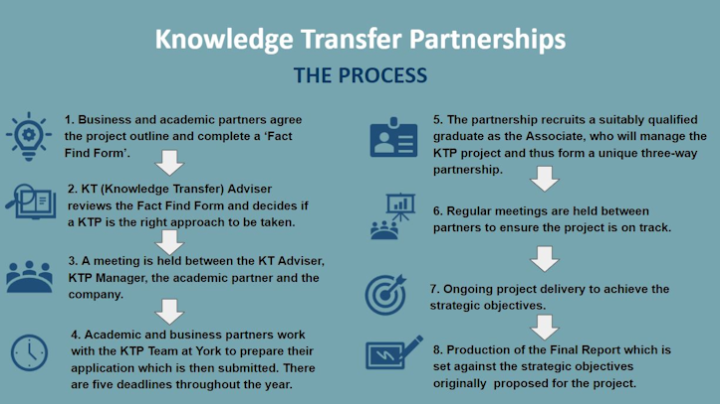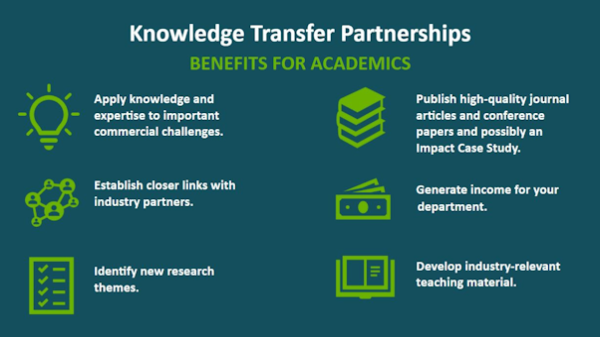Information for academic staff
Knowledge Transfer Partnerships provide superb opportunities to develop closer links with industrial partners, enabling the development of commercially relevant teaching materials, discovery of new research questions and generating research impact. By applying your knowledge and expertise to important business challenges you can develop rich case studies and undergraduate/postgraduate projects, and publish new journal articles and conference papers.
Whilst 'Knowledge Transfer' was initially intended and is often construed as being from the university/academic into the business, it is clear that it also happens in reverse, as well as being co-created in the partnership.
1. KTP - How do they work?

2. What academics say about KTP
"The ability to support cutting-edge innovation in virtual reality and other immersive media has been highly beneficial to us both in keeping our teaching absolutely current and in developing significant research impact. The insight and experience we gained through this KTP also contributed significantly to us securing two sizeable new research awards. It has been a very worthwhile project!"
Professor John Mateer, School of Arts and Creative Technologies
"The KTP has provided a number of benefits to staff. We have been exposed to the commercial side of computer vision and the commercialization of a product in the later stages of the project. We have experienced industrial planning and project execution which is quite different from the academic approach. We have had access to real data sources and have started a research project based on these. It has also brought us into contact with a number of other research groups both in the UK and in China.
"The KTP Associate on the Omnicom project is now their chief data scientist, and we appointed him as a visiting researcher in the Dept."
Professor Richard Wilson, Department of Computer Science
"A KTP has been a fantastic way for me to build on a relationship with an industry partner that was established during a BBSRC-funded project. The KTP enables us to develop new technology with the company, which they are using for commercial growth and we are using for fundamental research. The KTP Team provide great support at all stages of the process. The application requires considerable commercial input and clear explanations of the challenge and benefits of the partnership to both company and university, but the Team and KTP Advisors provide useful feedback - meaning when you submit an application there is a high likelihood of success."
Professor Katherine Denby, Department of Biology

"We did not expect to unearth fundamental research questions, nor to make progress on fundamental research whilst contributing to an applied research project. We have managed to do both. The project has been both intellectually stimulating while remaining commercially valuable to the company with the academics feeling that their work is making a real impact.
The KTP has had the perfect blend of applied research, the discovery of fundamental research questions, development of staff and academic/industry links and the creation of both commercially and academically valuable research. The research from this project has directly led to the creation of a product, a patent and published papers, including in a top journal. The experience has been extremely positive for the academics concerned and they have gained both valuable experience but also confidence that their research is of value to industry."
Dr William Smith, Department of Computer Science
3. What are the benefits of involvement in a KTP for academics?
There are numerous benefits attributable to your involvement in a KTP, the main ones are detailed in the illustration below but if you'd like to hear about others or find out more about those listed, please do contact the KTP Team.

4. What support is provided?
The KTP Team at the University assists in the development of and ongoing management of KTPs, from inception to completion, i.e. from pre Fact Finding Form and initial discussions with the business partner, through to Final Reporting for successfully delivered projects. They provide invaluable experience, advice and support in the completion of the KTP application (the application itself is submitted by the KTP team) and work with academics to ensure HR processes are completed efficiently during the recruitment of the Associate. They act as secretariat to the Local Management Committee meetings held every four months and liaise with Research Grants Operations in relation to finance queries, claims etc.
As the government's flagship knowledge transfer programme each partnership also receives the support and direction of a KT adviser from the national Knowledge Transfer Network (KTN).
5. The Application
Application Information
Applications for KTP open approximately every 2 - 3 months. The outcomes of applications are usually provided within 8 - 10 weeks and the Grant offer letter follows approximately 2 weeks after the initial notification.
Each KTP application is assessed against four criteria; Challenge and Impact which need to be demonstrated for each of the three partners, Innovation and finally the fourth criteria, project Cohesion.
Innovation
The application will need to demonstrate the innovation involved in the project- is it world leading, sector leading, how is it unique in the sector? Please note that a 'Me too' project to get the company up to a standard that would be considered 'normal' in the sector would not usually be considered innovative unless the KTP also provided the opportunity for the business to 'leap frog' others in the sector.
Challenge
A KTP cannot simply be work/research that could be delivered via consultancy, it can't be something that could be bought 'off the shelf' as it were. Neither can it be 'Blue Sky Research'. The project needs to be challenging to all three partners, so you as an academic, bring your field of expertise to the project and through the KTP you are challenged, testing your theories, developing new ones where appropriate, and developing a deeper understanding of your work's application in a real life setting. You need the business partner in order to develop your ideas, as much as the business needs you.
Impact
It is anticipated, based on project requirements, that you will open up new areas of research, you may develop case studies, student projects and possibly input into Masters or PhD programmes; it is also likely that you will develop a number of publications and attend relevant conferences based on the material developed and outcomes of the project. All of these are recorded in the application and represent the impact for the academic partner. There have been KTPs used for Impact Case Studies too.
Cohesion
This criteria reflects the requirement that the entire application must link together and form a cohesive story. From the choice of academic supervisor(s) with the relevant expertise, through the work plan developed to deliver key outcomes, and through to the person specification developed for the Associate. It should all make sense and clearly demonstrate a logical and well considered approach to solving the issue at hand.



